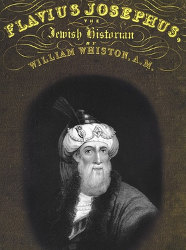Josephus: What He Wrote

Josephus composed four different works: one is biographical; one is apologetic; two are historical.
The Life: This is not a true autobiography but is mainly a defense of his actions at Jotapata during the war. He describes his first 25 years in two pages and devotes the rest of the space to his conduct during the early months of the rebellion against Rome. It is the least valuable of Josephus’ writings.
Against Apion: Apion was an anti-Semitic Gentile who had earlier launched a slanderous attack against the Jews before the Emperor Caligula. Josephus brilliantly defends his people and their Scriptures by answering the allegations in a most interesting manner.
The Jewish War: Rightly considered as Josephus’ masterpiece, this is his vivid, eyewitness account of the First Jewish Revolt against the Romans (66-73 A.D.). It is sometimes referred to by its Latin title Bellum Judaicum or “B.J.” for short. Sometimes this work is published separately and is an invaluable primary source on the topography of Jerusalem. It also contains a moving description of the fortress Masada and the mass suicide/murder of Jewish soldiers which took place there.
The Antiquities: Josephus’ longest work in 20 books ambitiously traces the history of the Jewish people from their biblical roots to the beginning of the war in 65 A.D. His treatment of the Old Testament accounts is sometimes straightforward, almost reproducing the biblical text word for word. However, often he adds many details, and at other times he makes glaring omissions.
Josephus includes many folklore stories found in rabbinic midrashim, or elaboration of the biblical stories. For example, Josephus believed Abraham deduced that God is one through observing the celestial phenomena. According to Genesis 12:10, Abraham went down to Egypt because of a famine. But according to The Antiquities, he went down to Egypt to debate with the wise men there. Such elaboration of the biblical text was not viewed as “tampering” by the Jewish ancients but as examples of concentrating on the inner experience and motivation of the characters. If we view Josephus as guilty in this realm, it must be remembered that many modern-day preachers sometimes do the same in their sermons.
 As Bible readers move from Malachi to Matthew, they encounter many new ideas, movements, and institutions never mentioned in the Old Testament. In the Gospels, for example, they read about synagogues, Pharisees, Sadducees, Zealots, and Romans. These words and many others never appeared before in the Old Testament. Readers also may learn that the Old Testament was written in Hebrew, while the New Testament was written in Greek.
As Bible readers move from Malachi to Matthew, they encounter many new ideas, movements, and institutions never mentioned in the Old Testament. In the Gospels, for example, they read about synagogues, Pharisees, Sadducees, Zealots, and Romans. These words and many others never appeared before in the Old Testament. Readers also may learn that the Old Testament was written in Hebrew, while the New Testament was written in Greek.
Discussion